
Background information
I’m about to become a chick parent
by Patrick Vogt

Mission «hatch chicken eggs» has sprung into life. Literally. At the same time, it’s becoming apparent that an egg or two won’t make it.
Are we doing everything right? Have we forgotten something? Will it work? Is anything ever actually going to happen? These and similar thoughts have been circling in my head since we filled our home incubator with chicken eggs and set everything up. You can read about how it came about in my previous article.
Yes, something’s happening and, yes, things seem to be going well.
First thing’s first: the first three days of incubation have been uneventful. At this stage, the embryos are extremely sensitive, so we’re keeping the incubator closed and not moving the eggs.
This means there’s nothing to see apart from two dozen chicken eggs that are (hopefully) incubating. Nevertheless, I’m nervous and stand in front of the incubator more often than necessary. I’m walking on eggshells and would prefer to get them out of the artificially generated warmth of the nest and do the job myself. The fact that I haven’t is probably due to my last scrap of common sense. So, I’m pulling myself together and trusting the reliability of our surrogate mother: the incubator.
On the fourth day, there’s real movement in the brood, so I activate the automatic turning function. The incubator now rotates the eggs several times a day. This prevents the embryos from sticking to the shell membranes and eventually dying. In the natural process, the hen turns the eggs.
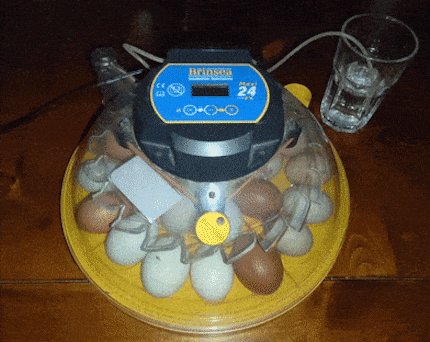
The rotating function results in our first sad discovery: one of the eggs is damaged. I don’t understand when, where and how it happened, but what’s for certain is that no chicks will be hatching from it. Unfortunately, it won’t be the only egg that I have to take out of the incubator prematurely before hatching day. I’ll explain why later.
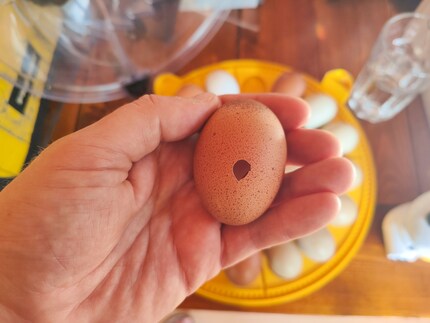
I’m now allowed to open the incubator briefly every day to let in fresh air. I use this opportunity on the eighth day to candle the eggs. That means examining them and checking whether something’s happening inside. I use a candling lamp with a special attachment on which I can place the egg. The light ones can also be illuminated with a strong torch. I’d rather play it safe though. I don’t want to do anything wrong.
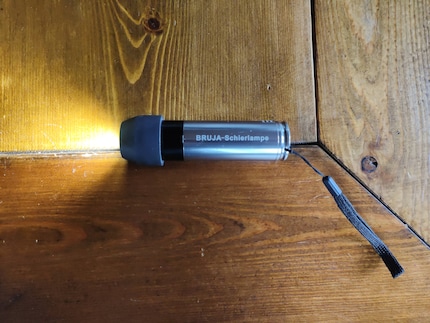
I’m euphoric as soon as I look at the first egg under the microscope – or, more accurately, under the candling lamp. I find a dark spot – which has to be the embryo. And fine blood vessels encircle it like a spider’s web.
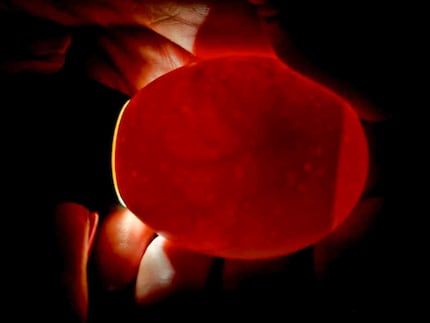
As a photo might not be very informative at this stage, I’ve recorded a video for clarity. Now it’s clear that this egg is alive and kicking. Seeing this with my own eyes is exciting, uplifting and a bit eerie in a good way.
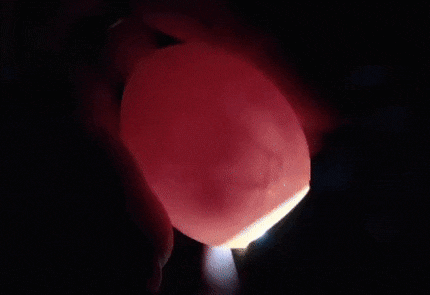
While my wife and I are in celebratory mood, our four-year-old daughter is initially quite relaxed. «She probably doesn’t associate the movements in the egg with a future chick yet,» I think to myself… and am corrected immediately. The very next day she excitedly tells her godparents that «chickies» are growing in our eggs and they’re already darting around. At least they will be soon, hopefully.
I don’t see signs of life in all eggs in the incubator. Some just have shells that are too dark, while I can only see a dark spot in others. It’d be presumptuous to expect a chick to eventually hatch from every single egg.
Nevertheless, I leave all the eggs in the incubator for the time being. I’ll double check them in a few days to be on the safe side. Then, whether I like it or not, I’ll separate out the eggs which have no sign of life. This is to make room for the chicks, which will then be full of life and force their way out of their shells.
Want to keep tabs on our incubation experiment? Follow me to make sure you don’t miss how many eggs we’re taking into the crucial phase of incubation.
Header image: Patrick Vogt
I'm a full-blooded dad and husband, part-time nerd and chicken farmer, cat tamer and animal lover. I would like to know everything and yet I know nothing. I know even less, but I learn something new every day. What I am good at is dealing with words, spoken and written. And I get to prove that here.
Interesting facts about products, behind-the-scenes looks at manufacturers and deep-dives on interesting people.
Show all